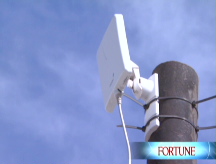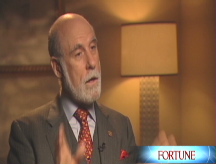The future of wireless is Down Under
Tech Daily: Australian telco Telstra spawns innovation with its ultrafast wireless network.
 |
| Telecom veteran Sol Trujillo predicts wireless technology will spawn entirely new kinds of businesses. |
NEW YORK (Fortune) -- Move over, Korea and Japan. Australia may soon be the envy of the world when it comes to advanced wireless networks and services.
Telstra, the former state-owned phone company, has spent the last three years building out a so-called "Next G" network, which currently boasts download speeds of more than 14 megabits per second. The network is, at its peak, about seven times faster than top speeds frequently reported by users of wireless modems on U.S. third generation, or 3G, networks.
As a result, average Australian consumers are able to avail themselves of the high-bandwidth wireless services - streaming wireless video or video chat on cell phones, say - most commonly associated with Japan and Korea, two countries that traditionally have been on the cutting edge of wireless services.
But what's really exciting about Telstra's network is that it is starting to spark innovation among entrepreneurs, engineers and software developers - much the way the Internet ushered in new business models.
"I would say true high-speed, near-ubiquitous wireless broadband is a game changer," said Telstra CEO Sol Trujillo. "It is a game changer for Telstra, and it is a game changer for an industry and for an economy."
Momentum, a software development company based in Melbourne, is using Telstra's high-speed network to stream live video from handheld devices or to other locations, say, a police station or hospital.
Adele Whish-Wilson, CEO of Momentum, says her company counts on ubiquitous wireless coverage - emergency workers sometimes get dispatched to rural areas that simply aren't served by Wi-Fi or Wi-Max networks, the wireless broadband standards often cited as alternatives to upgrading traditional wireless networks.
Whish-Wilson says Telstra's network has the potential to turn her home country into a technology center. "It is allowing Australian companies to build world-class technology because we have the infrastructure," she said.
Indeed, upstarts in Australia are using wireless broadband networks to provide physicians with remote, rapid feedback on radiology scans or to help mining companies monitor their far-flung sites for environmental and safety hazards.
Telstra's broadband push was born of necessity. Trujillo, who had been CEO of U.S. West and France's Orange before becoming CEO of Telstra in 2005, says the Australian company was losing market share when he arrived. Trujillo engineered a major shakeup of the company, bringing in new management, tussling with regulators and aggressively cutting costs, drawing criticism in the Australian press.
But his boldest move was upgrading the wireless network in a bid to increase revenue. Trujillo wagered that if provided with an ultrafast data network Australian consumers would pay a premium to watch videos and send multimedia text messages on their wireless devices, instead of just making calls.
Telstra says it invested about 1.1 billion Australian dollars ($765 million U.S.) in building its Next G network, which launched more than two years ago, and has since spent "hundreds of millions" more expanding its coverage. Next year the company plans to unveil to consumers an upgrade that will increase peak download speeds to 21 megabits per second.
Telstra's bet is starting to pay off. Average data revenue per user, a key metric for measuring the success of the data strategy, has more than doubled in the last two years. Overall, Telstra's revenues in fiscal 2008 rose 5%, to about $17 billion in U.S. dollars.
While Telstra's high-speed network may prove to be a boon for Australia's burgeoning tech scene, Trujillo argues that every major country will need to build out truly broadband wireless systems to remain competitive in the global economy.
In the United States, carriers eventually plan to migrate to fourth generation, or 4G, networks that could provide network download speeds of up to 50 megabits per second. Sprint (S, Fortune 500) has launched an early version of 4G service in Baltimore that serves up download speeds of two to five megabits per second, using the WiMax standard; other wireless companies like AT&T (T, Fortune 500) and Verizon (VZ, Fortune 500) seem to prefer a standard called LTE - short for Long Term Evolution. But based on the telcos' public statements, ubiquitous 4G coverage is several years away.
Trujillo warns that countries risk paying a hefty price if they don't invest in their wireless infrastructure. "We are leading the world, not Korea, not Japan, and that's exciting," Trujillo said. "But if you don't have a high-speed wireless platform you're not going to be as competitive" in terms of productivity gains.
Trujillo likens the productivity gains from high-speed wireless to the advancements businesses and consumers saw first from the rise of personal computers, then from software, and later from the Internet. "I believe the next wave of gains is coming," he said, "and it is going to be driven by wireless broadband." ![]()
-
 The retail giant tops the Fortune 500 for the second year in a row. Who else made the list? More
The retail giant tops the Fortune 500 for the second year in a row. Who else made the list? More -
 This group of companies is all about social networking to connect with their customers. More
This group of companies is all about social networking to connect with their customers. More -
 The fight over the cholesterol medication is keeping a generic version from hitting the market. More
The fight over the cholesterol medication is keeping a generic version from hitting the market. More -
 Bin Laden may be dead, but the terrorist group he led doesn't need his money. More
Bin Laden may be dead, but the terrorist group he led doesn't need his money. More -
 U.S. real estate might be a mess, but in other parts of the world, home prices are jumping. More
U.S. real estate might be a mess, but in other parts of the world, home prices are jumping. More -
 Libya's output is a fraction of global production, but it's crucial to the nation's economy. More
Libya's output is a fraction of global production, but it's crucial to the nation's economy. More -
 Once rates start to rise, things could get ugly fast for our neighbors to the north. More
Once rates start to rise, things could get ugly fast for our neighbors to the north. More












